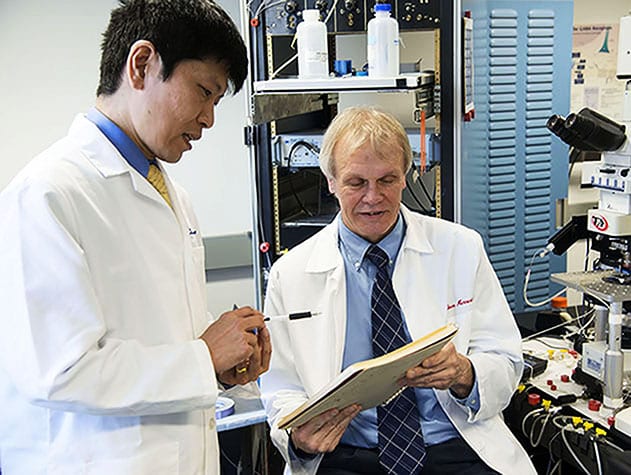
In 2012, Andrew and Barbara Taylor and the Crawford Taylor Foundation pledged $20 million to the Department of Psychiatry at Washington University’s School of Medicine to establish a research institute dedicated to advancing new treatments for mental illnesses. Just six years later, investigators in the department’s Taylor Family Institute for Innovative Psychiatric Research are on the cusp of a potential revolution in psychiatric medicine.
Institute members have developed sophisticated tools to study how cholesterol derived brain chemicals called neurosteroids and oxysterols regulate brain function. Their work has played a key role in the identification of new psychiatric drugs that target brain receptors affected by these chemicals. One such drug, brexanalone, is awaiting FDA approval after clinical studies conducted by Taylor Family Institute collaborators at Sage Therapeutics in Cambridge, Massachusetts, showed it significantly alleviated the symptoms of severe postpartum depression.
In order to accelerate the progress of this work and expand its application to other psychiatric conditions, Mr. and Mrs. Taylor and the Crawford Taylor Foundation recently committed an additional $10 million to the Taylor Family Institute. The gift, made in the final days of Leading Together: The Campaign for Washington University, will provide $7 million in expendable funds for research and $3 million to endow a distinguished professorship at the institute.
“The success of the Taylor Family Institute demonstrates the critical impact of private philanthropy on Washington University’s efforts to improve human health,” says David H. Perlmutter, MD, executive vice chancellor for medical affairs and the George and Carol Bauer Dean of the School of Medicine. “The Taylor family’s initial investment to launch the institute was instrumental in helping our scientists make discoveries that hold great promise for ameliorating the burden of mental illness, and their continued support will bolster our ability to work on the therapeutic frontiers of psychiatry.”
A Family’s Dedication
The new commitment was inspired in part by a briefing Andrew Taylor received from Taylor Family Institute Director Charles Zorumski, MD, the Samuel B. Guze Professor and head of the Department of Psychiatry. “Every few months Dr. Zorumski provides updates on the institute’s work, and during a meeting with him this summer, he told us how close we are to seeing the first neurosteroid drugs become available to patients with depression,” says Mr. Taylor, a life trustee of Washington University. “We want to make sure these and other new treatments make it across the finish line.”
“Our family has experienced mental illness, and that’s one reason it’s important for us to make a difference in this area. It’s tremendously exciting to think that our contributions to the Taylor Family Institute could help people around the globe.”
—Andy Taylor, life trustee and executive chairman of Enterprise Holdings
The Taylors’ latest gift for psychiatric research extends the family’s legacy of generosity at Washington University. In addition to their support for the Taylor Family Institute and other initiatives, the Taylors and Enterprise Holdings, the St. Louis-based company founded by Mr. Taylor’s father, the late Jack Taylor, have contributed $70 million to establish and expand the Enterprise Holdings Scholars program, which provides undergraduate scholarships to talented and deserving students with financial need. To date, the program has benefited more than 330 students.
Taylor family members also have provided outstanding leadership at Washington University. Jack Taylor served on the university’s Board of Trustees for more than 25 years. His son followed in his footsteps, joining the board in 1994. As chair of the public phase of Leading Together, Andrew Taylor helped drive the success of the campaign, which achieved record results. During Founders Day in November, he and Barbara will receive the Robert S. Brookings Award in recognition of their dedication to the university.
Mr. Taylor says his family’s involvement with the university provides opportunities to advance noble causes that improve lives. “Our family has experienced mental illness, and that’s one reason it’s important for us to make a difference in this area. It’s tremendously exciting to think that our contributions to the Taylor Family Institute could help people around the globe.”
Supporting Bold New Ventures
The World Health Organization estimates that psychiatric disorders affect more than 80 million Americans and roughly 25 percent of people throughout the world. Yet there are relatively few effective drugs for treating them. Most current medications address only a portion of a patient’s symptoms, and many have serious side effects.
According to Dr. Zorumski, pharmacological treatments for psychiatric conditions remain largely unchanged from past decades. “Most of the drugs used today focus on the same molecular targets in the brain as medications that were used 30 years ago,” he says. “If we keep making these drugs and don’t focus on other targets, the outcomes are going to be no different.”
In the six years since the Taylor Family Institute was launched, the multidisciplinary team of scientists affiliated with the institute—basic and clinical researchers from across the medical school with expertise in fields ranging from medicinal chemistry to animal behavior—has made significant progress in identifying novel ways to modify dysfunctional brain circuits associated with psychiatric disorders. During that time, they published more than 200 scientific papers and designed over 700 chemical compounds for possible use as psychiatric drugs.
In addition to supporting the institute’s leadership through the creation of a distinguished professorship, the new gift from the Taylors will provide crucial resources to continue research aimed at understanding how neurosteroid and oxysterol compounds affect brain function; expand the clinical testing of these drugs for a broad range of psychiatric illnesses; and apply gene editing, optogenetics and chemogenetics, and induced pluripotent stem cell technologies to develop personalized approaches to treatment.
“This is cutting-edge work that represents a bold new venture for the institute,” Dr. Zorumski says. “Without proof of concept, it would not be funded by traditional granting agencies. The Taylor family is making it possible for us to push the boundaries of our research forward. Their support keeps us focused and motivated to succeed.”
Taylor Family Institute Research Highlights
Milestones achieved by institute scientists to date include:
- The development of neurosteroid treatments for postpartum and major depression that augment the function of GABAA receptors in the brain
- Discovering that the oxysterol 24S-HC is an effective modulator of NMDA receptors, opening the door to its possible use as a treatment for cognitive dysfunction associated with severe psychiatric and neurological illnesses
- Research showing that another oxysterol, 25-HC, may be a key regulator of brain inflammation, which is believed to play a major role in multiple psychiatric and neurological conditions
- The development of new molecular tools and techniques for determining specific sites of action of neurosteroids and oxysterols, which will aid in the creation of highly specific drugs with fewer side effects
- Discovering that the anesthetic drug nitrous oxide, an inhibitor of NMDA receptors, may be a rapidly acting medication for treatment-resistant major depression


